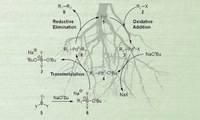Suzuki reaction promoted by catalyst produced from plant roots
The Suzuki cross-coupling reaction is among the most important ones in organic chemistry, allowing the obtainment of scaffolds present in building blocks in medicinal chemistry, natural products and polymers, among others. This type of reaction is usually promoted by palladium-based catalysts, a high-value noble metal.
In the search for more sustainable processes, a French research group developed a catalyst for the Suzuki reaction produced from the roots of plants that are able to bioaccumulate palladium. The developed catalyst showed to be highly efficient to promote the coveted reaction, giving the products with high yields and being recycled in other reaction cycles.
The production of catalysts from plants has been a fast-growing field in the last few years, giving rise to the so-called “eco-catalysis”, which is based on the ability of some plants to accumulate metals in their shoots and roots.
For further information, see:
http://pubs.rsc.org/en/Content/ArticleLanding/2017/GC/c7gc01672g#!divAbstract

